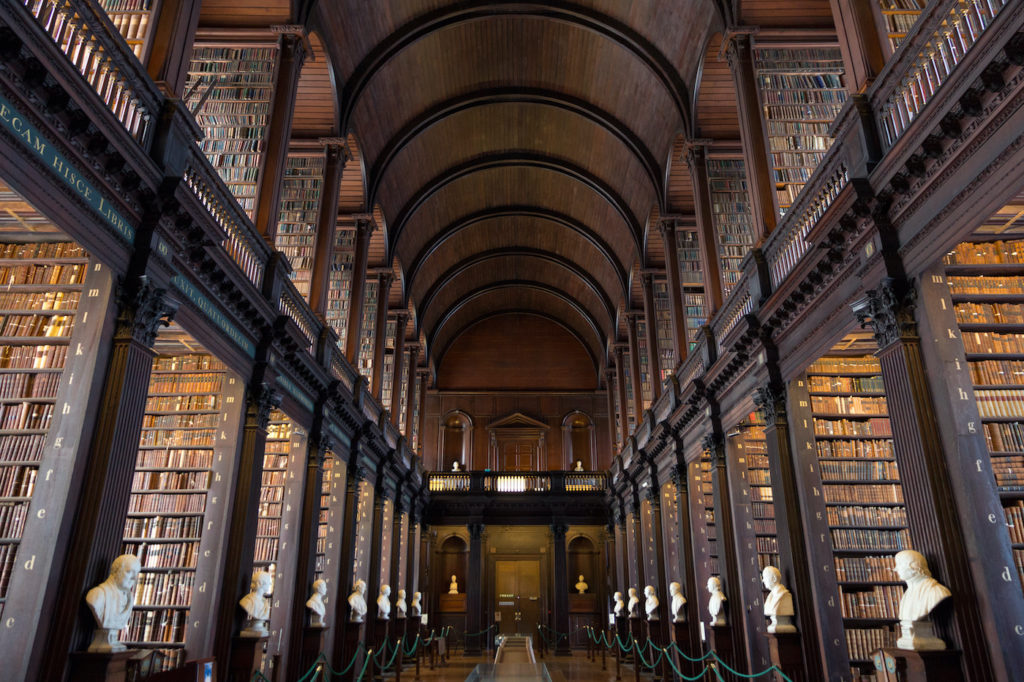In a recent Quillette essay, William Deresiewicz explains why he has left academia. After ten years on the faculty at Yale, he had failed to get tenure there or land another job elsewhere, despite having a “decent publication record,” including a book accepted for publication. The problem was that he “wanted to read books” because he loved them and lived his “deepest life in books; because art, particularly literary art, meant everything to me.”
He didn’t realize that genuine love of literature was antithetical to an academic career in English. The purpose of the English profession is not to study or appreciate literature, but “to interrogate texts” for their ideological commitments. The question driving the research is: what political beliefs are covertly driving this text? During Deresiewicz’s first week of graduate school, a professor said to him: “The most important thing for a first-year graduate student to do is to figure out where they stand ideologically.”
How did English studies end up in this strange place? Terry Eagleton’s 2022 book Critical Revolutionaries: Five Critics Who Changed the Way We Read explores five towering literary critics who paved the path for politically driven readings of texts. Currently the Distinguished Professor of English Literature at Lancaster University with previous stints at Oxford and Manchester, Eagleton is a committed Marxist and author of over fifty books. However, he remains best known for his 1983 book, Literary Theory: An Introduction. This work planted theory as the tentpole for English departments, staking the claim that all literary theory is necessarily political. For English graduate students then the question is not whether one is a Marxist—but what kind.
Critical Revolutionaries looks back and explores the lives and works of literary critics and writers affiliated with Cambridge: T. S. Eliot, I. A. Richards, William Empson, F. R. Leavis, and Raymond Williams. Eagleton traces a tradition of modernism that he believes is in danger of being neglected. Self-consciously breaking with Victorian forms of poetry and fiction writing, modernism experimented with both form and expression to reflect the new sensibilities of the 1920s and ’30s. Haunted by the horrors of World War I, fascinated with technological advances, and navigating changes in social norms and values, modernist writers disregarded previous literary genres and adopted such techniques as stream of consciousness, nonlinear narratives, and absurdism so as, to follow Ezra Pound’s maxim, to “make it new.”
Start your day with Public Discourse
Sign up and get our daily essays sent straight to your inbox.At first glance, it seems strange that Eagleton, a committed Marxist, wants to resurrect the tradition of literary modernism. What does The Wasteland or To the Lighthouse have in common with Marx’s theory of dialectical materialism?
But under a closer inspection a common theme emerges. Besides Eliot, the figures Eagleton examines are primarily known for their literary criticism. According to Eagleton, the close reading of texts that these critics advocated laid down the foundation for the literary and critical theory that would come after. They were “critical revolutionaries” who broke the traditional Victorian modes of writing, thereby freeing the discipline from its former constraints. They were the unwitting agents of history, only to be retrospectively recognized by the likes of Eagleton for their contributions to Marxist ideology.
Haunted by the horrors of World War I, fascinated with technological advances, and navigating changes in social norms and values, modernist writers disregarded previous literary genres and adopted such techniques as stream of consciousness, nonlinear narratives, and absurdism.
The Critics
Given his Christian faith and traditionalist politics, the inclusion of T. S. Eliot (1888-1965) is an odd choice, as Eagleton admits: “By this point, the enlightened reader may well be wondering whether anything of value can be salvaged from this full-blooded reactionary.” But for Eagleton, Eliot is an ally. The poet and essayist served as “a radical of the right” who rejected the liberal-capitalist ideology of his age: its individualism, self-interest, and the organization of society on “private profit.” While radicals on the left would reject Eliot’s substantive commitments to elitism, class prejudice, and Anglicanism, they can get behind Eliot’s criticism: “There is nothing here with which an ecologically minded socialist would disagree.”
Eagleton interprets Eliot’s literary criticism as a forerunner of social and critical theory. He gathers from Eliot’s essay, “Tradition and the Individual Talent,” that tradition is “for the most part a matter of interpretation.” Eliot’s theory of poetic impersonality is also a matter of interpretation. A poem means as much to the reader as to the writer, and over time “the poet becomes simply one more reader of his or her own work, perhaps forgetting or reinventing its original sense.”
But Eagleton’s interpretations of Eliot’s work don’t quite stand up under scrutiny. While it is true that Eliot’s account of tradition accepts that the introduction of new works will alter the existing literary order, it does not mean that what has gone before can be interpreted away. Likewise, poetic impersonality does claim a poem has an independent existence outside the poet, but it does not mean the poem can be interpreted free of any context. It is part of a tradition that the poem paradoxically both refers back to and transcends. Simply put, art does not occur in a vacuum; its context is at least partially binding, however much Eagleton wishes it were otherwise.
Eagleton’s reading of the four other figures, however, is more consistent with their own claims. I. A. Richards (1893-1979) and William Empson (1906-84) are associated with New Criticism, which emphasized a close reading of works, particularly poetry, and examined how they functioned as self-contained and self-referential literary pieces. Richards is known for his Principles of Literary Criticism (1924), Practical Criticism (1929), The Philosophy of Rhetoric (1936), as well as, with C. K. Ogden, The Meaning of Meaning (1923). Anticipating Derrida’s theory of deconstruction, Richards and Ogden argued that there was no inherent relation between a word and a thing: “words only attach themselves to objects within a specific context or situation.” But Richards’s debt to social sciences and belief in progress kept him from embracing postmodernism and nihilism. For Eagleton, that makes him a Marxist in spirit.
Richards’s student, William Empson, is best known for his work, Seven Types of Ambiguity, which contends that linguistic ambiguity is inherent in poetry. Like Richards, Empson believes there is no inherent relation between a word and a thing. By rejecting a normative conception of language, Empson accepts the discord, contradictions, and messiness in a poem and the interpretations of it. He also, according to Eagleton, gives the reader “a key role in the constitution of the poem.” Because language is fluid, and because readers have authority in determining the meaning of texts, Empson’s literary criticism eventually leads to the “emancipatory theories such as feminism, which engages in the systematic analysis of patriarchy in order to be free of it.”
Sometimes associated, albeit incorrectly, with the New Critics, F. R. Leavis (1895-1978) thought art, literature itself, should be the focus of discussion. However, he thought that art was never self-contained and self-referential. The literary critic’s duty was to assess works according to the author’s and society’s moral position. Literature must be understood this way because language, according to Eagleton, “does not simply indicate things but embodies or ‘enacts’ them. It performs what it speaks of, creates what it communicates, so that you cannot slide a cigarette paper between the word and the experience they record.”
Everything is Political
For Eagleton, literary modernism culminates in the socialist Raymond Williams (1921-88), who laid down the foundation for cultural studies and cultural materialism. He also contributed to the New Left, the 1960s political movement that adopted Marx’s theory of class struggle, and campaigned for social issues like civil rights, gay rights, environmentalism, and feminism.
Influenced by Antonio Gramsci, Williams believed that culture was merely a “productive process”—part of the “means of production” of a Marxist account of history. Canonical texts like Shakespeare or Austen validated certain ideologies for the established political powers. By focusing on historical context and adopting a close textual reading, Williams believed that both a theoretical method and a political commitment were needed to excavate the ideologies buried in literature. Williams, therefore, midwifed the transition from literary criticism—the study, evaluation, and interpretation of literature—to literary theory—the adoption of different theoretical frameworks to evaluate and interpret works as they relate to the author, reader, and society. In other words, everything is political.
As a committed Marxist, Eagleton believes in truth, albeit a materialist and dialectical one—but at least it is a truth when compared to postmodernism’s literary nihilism, something both Williams and Richards rejected. I suspect this is why Eagleton has looked back to a period before literary theory emerges: he perhaps wants to draw a sharp distinction between literary theory during his time and what it has become now. By tying his tradition to a time when literature was taken seriously in the 1920s and 30s, Eagleton can claim his Marxist literary theory has a certain respectability—one that contemporary poststructuralist and nihilistic French imports lack.
Raymond Williams midwifed the transition from literary criticism—the study, evaluation, and interpretation of literature—to literary theory—the adoption of different theoretical frameworks to evaluate and interpret works as it relates to the author, reader, and society. In other words, everything is political.
Of course, it’s fair to wonder how politically committed Eagleton is to his project, as William Deresiewicz notes in his review of Eagleton’s After Theory (2003): “Eagleton wishes for capitalism’s demise, but as long as it’s here, he plans to do as well as he can out of it. Someone who owns three homes shouldn’t be preaching self-sacrifice.” While we probably can’t return to a state of literary criticism without theory, literary studies have become, according to novelist and critic David Lodge, “boringly predictable to many people who were once enthusiastic about it.” Or, as Deresiewicz puts it, English departments are really “a story of misplaced institutional priorities.”
But for those, like Deresiewicz, who still believe that books can “literally change” one’s life, there are reasons for hope. In his brilliant (and very funny) review of Terry Eagleton’s Critical Revolutionaries, Lee Oser showcases the Oxford school of Tolkien and Lewis as a lost but still available path for literary criticism to pursue. Other disciplines like political science have taken up the study of literature in ways that reject Marxism and have produced scholarly works that value literature instead of theory. There is talk of an emerging Catholic literary Renaissance.
But after reading Critical Revolutionaries, the message is quite clear for those who love literature: avoid graduate school, find others who share your passion, and recover a proud tradition now lost to ideology and politics.














